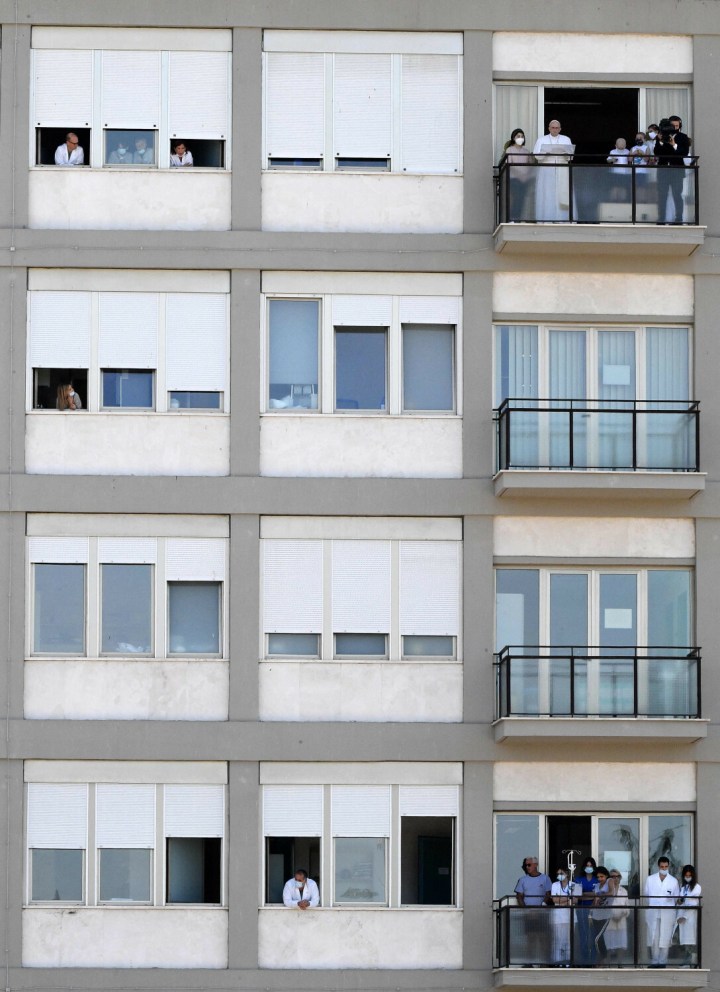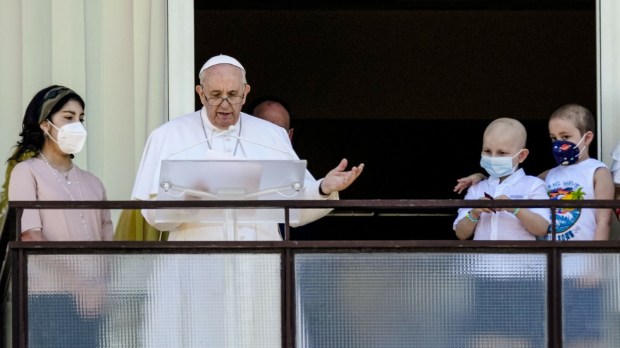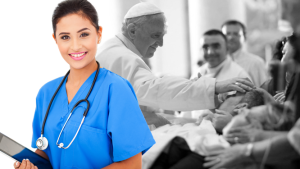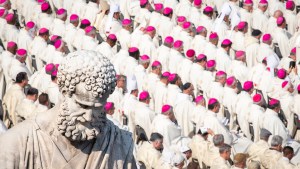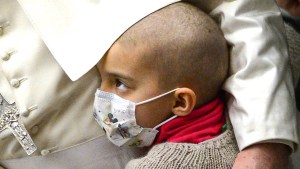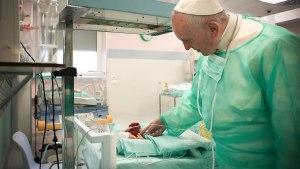Pope Francis repeated his appreciation for healthcare workers as he led the midday Angelus from a 10th floor window of the Gemelli hospital, where he has been a patient for a week, following a scheduled colon surgery on July 4. His recuperation is going as planned, according to daily reports from the Vatican press office, and today he looked well, with only some bandages still on his right hand indicating his continued hospital stay.
“I thank you all: I have felt your closeness and the support of your prayers. Thank you from the bottom of my heart!” he said to the faithful in the patio below, and those tuned in through media.
The Holy Father credits a nurse with saving his life when he was a young man with a serious lung infection. He repeatedly has expressed his admiration for nurses and health care workers and he said so again today, as many of the Gemelli staff were outside to see their VIP patient.
I would like to express my appreciation and my encouragement to the doctors and all the healthcare workers and staff of this and of other hospitals. They work so hard!
The Pope noted how the day’s Gospel reading references the sacrament of the Anointing of the Sick, as it explains how the disciples “anointed with oil many that were sick and healed them” (Mk 6:13).
But, he said, “this ‘oil’ is also listening, the closeness, the care, the tenderness of those who take care of the sick person: It is like a caress that makes you feel better, soothes your pain and cheers you up.”
All of us, everyone, sooner or later, we all need this “anointing” of closeness and tenderness, and we can all give it to someone else, with a visit, a phone call, a hand outstretched to someone who needs help.
Let us remember that, in the protocol of the final judgment – Matthew 25 – one of the things they will ask us will be about closeness to the sick.
Importance of health care
Pope Francis also shared that his time in the hospital has made him again experience “how important good health care is, accessible to all, as it is in Italy and in other countries.”
Free health care, that assures good service, accessible to everyone. This precious benefit must not be lost. It needs to be kept! And for this, everyone needs to be committed, because it helps everyone and requires everyone’s contribution.
With this, the Pope was summarizing a position of the Church’s social doctrine, as often reiterated by various group, for example here, the bishops of the United States:
For the Catholic Church, health care is both a human right and a demand of the common good: the dignity of the human person makes a claim of justice on access to health care, and health is a societal good that can only be attained by working together.
In this regard, the Pope warned, profit cannot be the motivating factor, especially for Church health care institutions. He said:
In the Church it also happens at times that some healthcare institution, due to poor management, does not do well economically, and the first thought that comes to mind is to sell it. But the vocation, in the Church, is not to have money; it is to offer service, and service is always freely given. Do not forget this: to save free institutions.
Why do children suffer?
Finally, Pope Francis spoke of some young pediatric patients who accompanied him on the balcony. Gemeilli’s pediatric oncology ward is not far from the Holy Father’s own hospital rooms.
“Let us pray for all the sick,” he said. “Here there are some friends, sick children…. Why do children suffer? Why children suffer is a question that touches the heart. Accompany them with prayer and pray for all those who are sick, especially for those in the most difficult conditions: May no one be left alone, may everyone receive the anointing of listening, closeness, tenderness and care. Let us ask this through the intercession of Mary, our Mother, Health of the Sick.”
The suffering of children is an issue that the Pope has addressed various times. In 2015, he discussed it at length, acknowledging that it is a difficult mystery:
You might ask, “but you, a bishop,” you have “studied so much theology, and you have nothing more to tell us?” No. The Trinity, the Eucharist, the grace of God, the suffering of children are a mystery.
See more of his reflection below:
